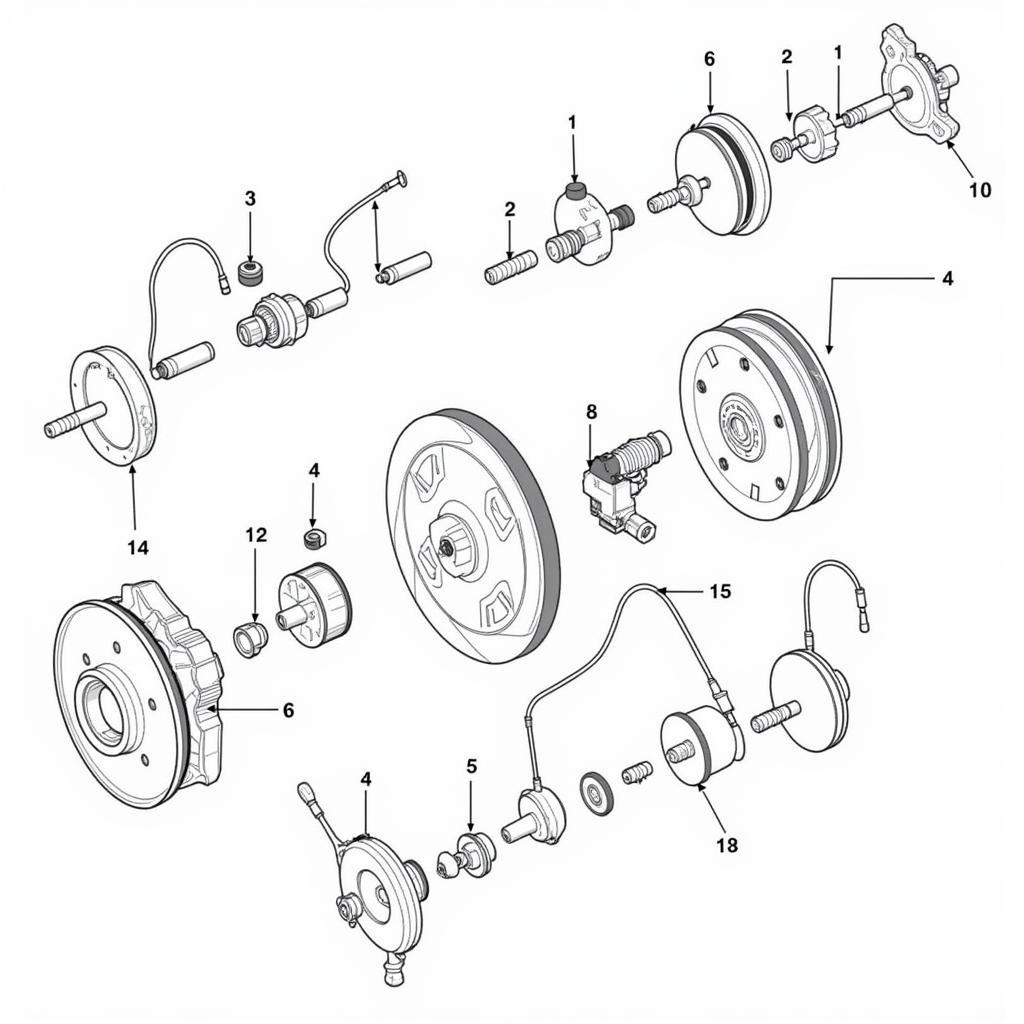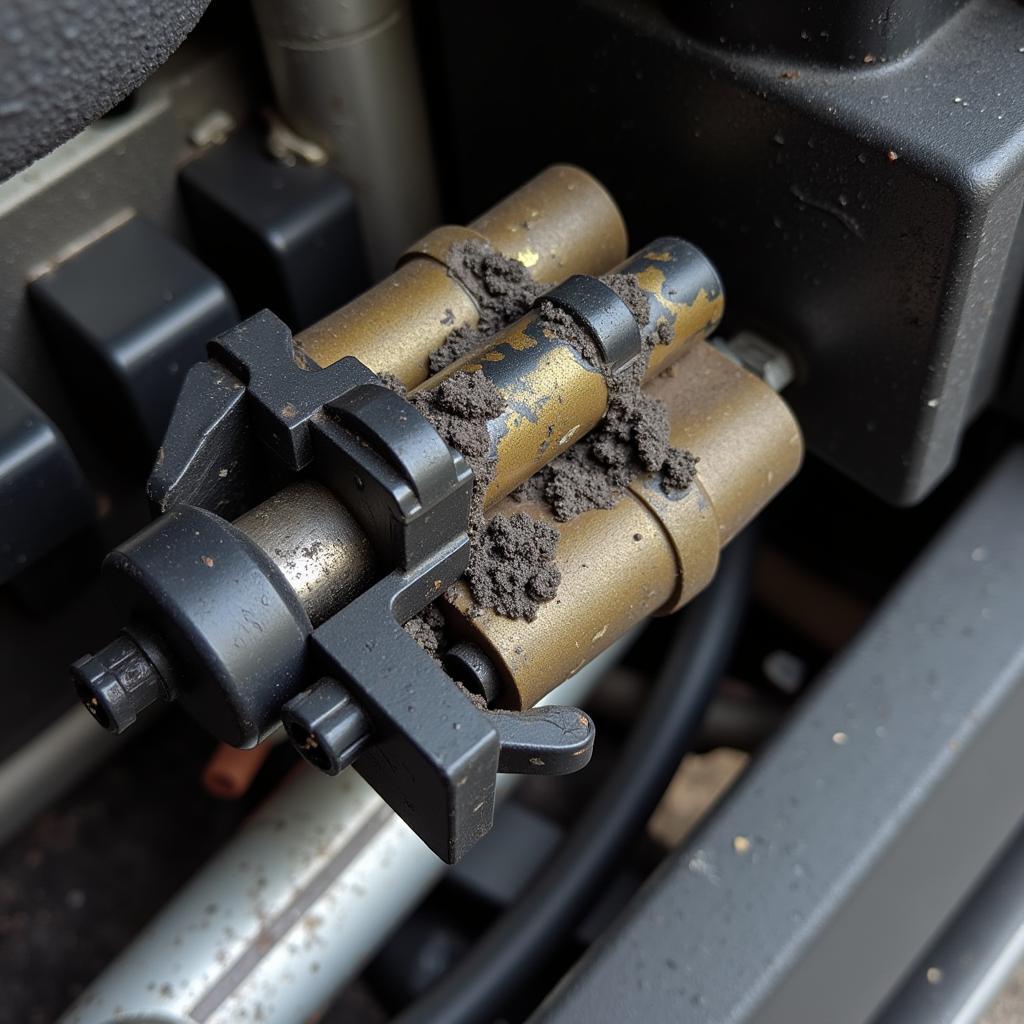Seeing a red brake warning light illuminate on your Audi A4 B5’s dashboard can be a nerve-wracking experience. This warning light, often accompanied by a chime, signals a potential problem with your braking system that requires immediate attention. Ignoring it could lead to brake failure, putting you and others at risk.
This comprehensive guide will walk you through the possible causes of the Audi A4 B5 red brake warning light and provide you with potential solutions to get you back on the road safely.
Understanding Your Audi A4 B5 Brake System
Before diving into the causes and solutions, it’s helpful to have a basic understanding of how your Audi A4 B5’s brake system operates. The system is comprised of several key components working together to ensure safe and efficient stopping power.
- Hydraulic System: This system uses brake fluid to transmit force from the brake pedal to the wheels.
- Brake Master Cylinder: Pressing the brake pedal activates the master cylinder, which pressurizes the brake fluid.
- Brake Calipers and Pistons: The pressurized fluid activates the pistons within the calipers, pushing the brake pads against the rotors.
- Brake Rotors and Pads: Friction generated between the pads and rotors slows down the wheel’s rotation.
- Brake Fluid Reservoir: This reservoir stores the brake fluid.
A fault in any of these components can trigger the red brake warning light.
 Audi A4 B5 Brake System Diagram
Audi A4 B5 Brake System Diagram
Common Causes of the Red Brake Warning Light
Several issues can trigger the red brake warning light on your Audi A4 B5. Let’s explore the most frequent culprits:
1. Low Brake Fluid Level
The most common culprit behind the red brake warning light is a low brake fluid level. This can occur due to a leak in the system or worn brake pads. When the brake fluid level drops below a certain point, a sensor in the reservoir triggers the warning light.
Solution: Check your brake fluid reservoir located under the hood. If the level is low, top it up with the recommended DOT 4 brake fluid. However, it’s crucial to address the underlying cause of the low fluid level. If you suspect a leak, have a qualified mechanic inspect your brake lines, hoses, and calipers.
2. Worn Brake Pads
Brake pads naturally wear down over time due to constant friction with the rotors. Extremely worn pads can also trigger the red brake warning light. Most Audi A4 B5s have a wear sensor embedded in the brake pads. When the pad material wears thin, this sensor contacts the rotor, completing a circuit and illuminating the warning light.
Solution: Inspect your brake pads for wear. If they appear thin or you notice a grinding noise when braking, it’s time for a replacement. It’s recommended to have a professional mechanic replace brake pads as it involves working with brake components and ensuring proper installation.
3. Faulty Brake Light Switch
While it might seem unrelated, a faulty brake light switch can also trigger the red brake warning light on some Audi A4 B5 models. The brake light switch activates your brake lights when you press the pedal. If it malfunctions, it can disrupt the brake light circuit, often leading to the illumination of the warning light.
Solution: If you suspect a faulty brake light switch, it’s best to have a qualified mechanic diagnose and replace it if necessary. This is a relatively inexpensive repair that can prevent further issues.
4. ABS Issues
The Anti-lock Braking System (ABS) plays a critical role in preventing wheel lockup during hard braking, improving vehicle control. Your Audi A4 B5’s ABS system relies on sensors to monitor wheel speed. If one or more sensors malfunction or get covered in dirt or debris, it can disrupt the ABS functionality, triggering the warning light.
 Worn ABS Sensor on Audi A4 B5
Worn ABS Sensor on Audi A4 B5
Solution: Diagnosing ABS issues often requires specialized tools. It’s recommended to have a mechanic, preferably one specializing in Audi vehicles, diagnose the issue. They can retrieve fault codes from the ABS module, pinpoint the faulty sensor, and perform the necessary repairs.
5. Other Potential Causes:
- Faulty Brake Master Cylinder: A leak or internal failure in the master cylinder can lead to pressure loss in the braking system, triggering the warning light.
- Air in the Brake Lines: Air trapped in the brake lines can compress, leading to a spongy brake pedal and reduced braking efficiency. This can also trigger the warning light in some cases.
- Electrical Problems: A short circuit or wiring issue within the brake light circuit can also lead to the illumination of the warning light.
What to Do When the Red Brake Warning Light Comes On
If the red brake warning light illuminates while driving, it’s crucial to react promptly and safely:
- Stay Calm: Avoid panic, as sudden maneuvers can be dangerous.
- Reduce Speed Gradually: Gently ease off the accelerator and gradually slow down.
- Find a Safe Place to Stop: Signal and carefully pull over to a safe location away from traffic.
- Assess the Situation: Once safely parked, check your brake fluid level. If it’s low, top it up with the appropriate brake fluid. However, refrain from driving further until the underlying cause is addressed.
- Seek Professional Help: If topping up the brake fluid doesn’t resolve the issue or you suspect a more serious problem, it’s crucial to call for roadside assistance or have your vehicle towed to a trusted mechanic.
Preventing Future Brake Warning Light Issues
Prevention is always better than cure. Here are a few proactive measures to minimize the chances of encountering the red brake warning light on your Audi A4 B5:
- Regular Brake Fluid Checks: Inspect your brake fluid level at least once a month and top it up whenever necessary.
- Adhere to Brake Pad Replacement Intervals: Consult your owner’s manual for recommended brake pad replacement intervals and adhere to them diligently.
- Brake Fluid Flush: It’s recommended to flush and replace your brake fluid every 2-3 years or as recommended in your owner’s manual. This helps maintain optimal brake system performance and prevents internal corrosion.
- Timely Inspections: Incorporate regular brake inspections into your vehicle maintenance routine. A trusted mechanic can identify potential issues before they escalate into major problems.
Conclusion
The red brake warning light on your Audi A4 B5 is a critical safety feature that should never be ignored. By understanding the potential causes and solutions outlined in this guide, you can address the issue promptly and safely. Remember, regular maintenance and timely repairs are essential to prevent brake system failures and ensure your safety on the road.
FAQs
1. Can I drive my Audi A4 B5 with the red brake warning light on?
It’s highly discouraged to drive your Audi A4 B5 with the red brake warning light illuminated. This light signifies a potential problem with your braking system, and continuing to drive could lead to brake failure, putting you and others at risk.
2. How much does it cost to fix the red brake warning light on an Audi A4 B5?
The repair cost depends on the underlying cause. Simple fixes like topping up brake fluid or replacing a faulty brake light switch are relatively inexpensive. However, more complex repairs like replacing a brake master cylinder or ABS components can be significantly more costly.
3. Can I add any brake fluid to my Audi A4 B5?
No, it’s crucial to use only the recommended DOT 4 brake fluid for your Audi A4 B5. Using the wrong type of brake fluid can damage the braking system’s components. Refer to your owner’s manual for the correct brake fluid specifications.
4. How often should I replace my Audi A4 B5’s brake pads?
The lifespan of brake pads varies depending on driving conditions and habits. However, it’s generally recommended to have your brake pads inspected every 12,000 miles and replaced when they reach the minimum thickness specified in your owner’s manual.
5. Is it safe to replace brake pads myself on an Audi A4 B5?
While replacing brake pads might seem straightforward, it’s recommended to have this procedure performed by a qualified mechanic. Brake systems are critical safety components, and improper installation can have serious consequences.

